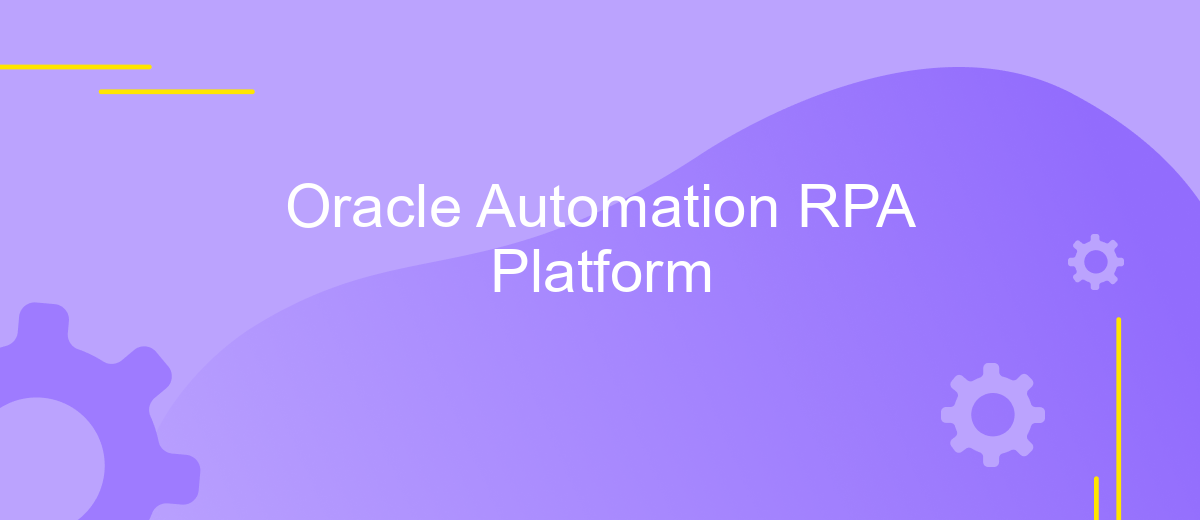Oracle Automation RPA Platform
In today's rapidly evolving digital landscape, businesses are increasingly seeking ways to streamline operations and enhance efficiency. The Oracle Automation RPA Platform emerges as a powerful solution, offering cutting-edge robotic process automation capabilities. By integrating seamlessly with existing systems, it empowers organizations to automate repetitive tasks, reduce errors, and drive productivity. Discover how Oracle's innovative platform can transform your business processes and unlock new levels of operational excellence.
Introduction
Oracle Automation RPA Platform is revolutionizing the way businesses manage repetitive tasks by leveraging cutting-edge robotic process automation (RPA) technology. This platform is designed to streamline operations, enhance efficiency, and reduce human error by automating routine processes. With Oracle's robust infrastructure, organizations can seamlessly integrate RPA into their existing systems, allowing for improved productivity and cost savings.
- Efficiently automates repetitive and time-consuming tasks.
- Seamlessly integrates with existing Oracle infrastructure.
- Reduces operational costs and minimizes human error.
- Enhances productivity by freeing up human resources for strategic tasks.
- Provides scalable solutions tailored to business needs.
As businesses strive to stay competitive, the Oracle Automation RPA Platform offers a transformative solution that not only meets current demands but also anticipates future challenges. By adopting this technology, companies can focus on innovation and strategic growth, knowing that their operational processes are optimized and reliable. With Oracle's commitment to excellence, the platform ensures a seamless transition to a more automated and efficient business model, paving the way for a successful digital transformation.
Benefits and Features

The Oracle Automation RPA Platform offers a transformative approach to business operations by streamlining repetitive tasks and enhancing productivity. Its robust automation capabilities enable organizations to reduce manual errors and improve efficiency, allowing employees to focus on more strategic activities. The platform's user-friendly interface simplifies the automation process, making it accessible to users with varying technical expertise. Moreover, with built-in analytics, businesses can gain valuable insights into their operations, facilitating data-driven decision-making and continuous improvement.
One of the standout features of the Oracle Automation RPA Platform is its seamless integration capabilities. By leveraging services like ApiX-Drive, businesses can effortlessly connect various applications and automate workflows without the need for complex coding. This integration flexibility ensures that organizations can tailor their automation solutions to meet specific needs, fostering a more agile and responsive business environment. Additionally, the platform's scalability ensures that it can grow alongside the business, accommodating increasing demands and evolving technological landscapes.
Use Cases and Applications

Oracle Automation RPA Platform offers a versatile solution for streamlining business processes across various industries. By automating repetitive tasks, organizations can enhance operational efficiency and reduce human error. This platform is particularly beneficial in sectors such as finance, healthcare, and supply chain management, where precision and speed are crucial.
- In finance, Oracle's RPA can automate invoice processing, reducing the time spent on manual data entry and improving accuracy in financial reporting.
- Healthcare organizations can leverage RPA to automate patient data management, ensuring that records are updated in real-time and accessible to medical professionals when needed.
- In supply chain management, Oracle's platform can optimize inventory tracking and order processing, resulting in faster delivery times and improved customer satisfaction.
Furthermore, Oracle Automation RPA Platform is designed to integrate seamlessly with existing IT infrastructure, allowing businesses to implement automation without extensive overhauls. Its scalability ensures that as a company grows, the platform can handle increased workloads efficiently. Overall, Oracle's RPA solution not only enhances productivity but also provides a competitive edge by enabling businesses to focus on strategic initiatives rather than mundane tasks.
Architecture and Components

The Oracle Automation RPA Platform is designed to streamline business processes through intelligent automation. At its core, the platform integrates seamlessly with existing Oracle applications, ensuring a smooth transition from manual to automated workflows. The architecture is built on a scalable cloud infrastructure, allowing businesses to expand their automation capabilities as needed.
Key components of the platform include a robust orchestration engine and a set of pre-built connectors. These elements work together to automate repetitive tasks, reduce human error, and enhance operational efficiency. The platform also features advanced analytics tools, providing insights into process performance and optimization opportunities.
- Orchestration Engine: Manages and coordinates automated workflows.
- Pre-built Connectors: Facilitate integration with various Oracle and third-party applications.
- Analytics Tools: Offer real-time insights and reporting for continuous improvement.
- Security Framework: Ensures data protection and compliance with industry standards.
With its comprehensive architecture, the Oracle Automation RPA Platform empowers organizations to automate complex processes across different departments. This leads to increased productivity, cost savings, and a more agile business environment. As a result, companies can focus on strategic initiatives rather than mundane operational tasks.


Best Practices and Implementation Considerations
When implementing Oracle Automation RPA Platform, it is crucial to start with a comprehensive analysis of business processes to identify potential areas for automation. Prioritize tasks that are repetitive, time-consuming, and error-prone. Establish clear goals and metrics to measure the success of the automation initiative. Engage stakeholders from different departments to ensure alignment and gather diverse insights, which can aid in creating a robust automation strategy. Additionally, conduct pilot tests to evaluate the platform's effectiveness and make necessary adjustments before full-scale deployment.
Integration is a key consideration for successful implementation, and leveraging tools like ApiX-Drive can streamline this process. ApiX-Drive facilitates seamless connections between Oracle Automation RPA and various business applications, enhancing data flow and operational efficiency. Ensure that your IT team is well-equipped with the necessary skills to manage and maintain the platform. Regularly update and optimize the automated processes in response to changing business needs. Lastly, foster a culture of continuous improvement by encouraging feedback and innovation, ensuring that the automation strategy evolves alongside the organization.
FAQ
What is Oracle Automation RPA Platform?
How does Oracle Automation integrate with existing systems?
What are the benefits of using Oracle Automation RPA Platform?
How can I start implementing Oracle Automation RPA in my organization?
What challenges might I face when implementing Oracle Automation RPA?
Time is the most valuable resource for business today. Almost half of it is wasted on routine tasks. Your employees are constantly forced to perform monotonous tasks that are difficult to classify as important and specialized. You can leave everything as it is by hiring additional employees, or you can automate most of the business processes using the ApiX-Drive online connector to get rid of unnecessary time and money expenses once and for all. The choice is yours!

